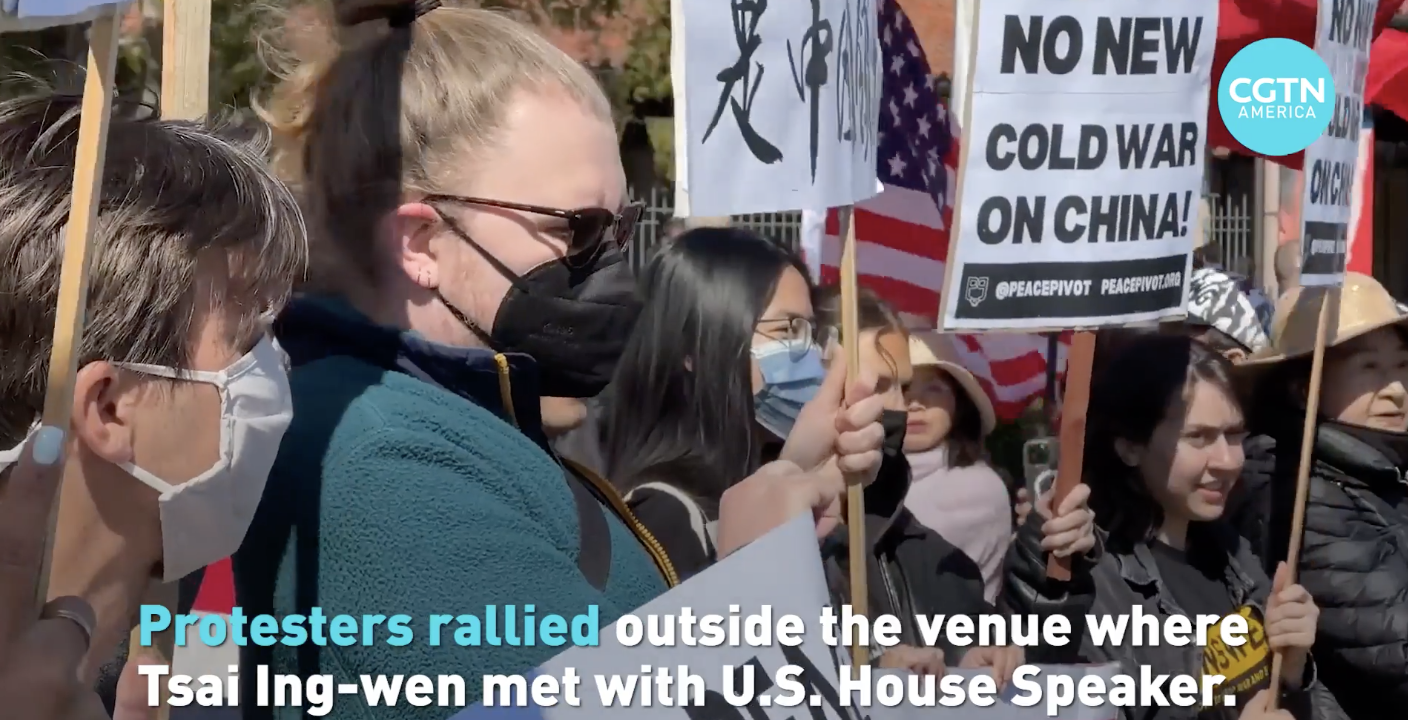
Editor's note: CGTN's First Voice provides instant commentary on breaking stories. The column clarifies emerging issues and better defines the news agenda, offering a Chinese perspective on the latest global events.
Across the Pacific Ocean, two political parties found a common cause in the so-called "countering of China's influence": The Republican Party in the United States and the Democratic Progressive Party (DPP) in China's Taiwan region.
Nowadays, there's certainly a "who's tougher on China" competition going on between both Democrats and Republicans. But the Republican Party, usually considered to "own" foreign policy in elections, is definitely putting more emphasis and behaving louder and harsher on this issue. A Pew Research Center poll in 2022 found that 40 percent of Republicans see the tension between the Chinese mainland and the Taiwan region as a very serious problem for the United States, eight points ahead of the Democrats' views.
"Therefore, it is practical for Republicans to mobilize their base by playing the Taiwan card when cross-strait relations intensify in order to shift electoral contests away from the domestic issues that benefit Democrats," the article "The 'Taiwan Card' in US Domestic Politics" published by The Diplomat articulated.
And now, Republicans have more ammunition. As Associated Press pointed out, no Speaker of the House is known to have met with a Taiwan leader on U.S. soil since the United States broke off diplomatic relations with the region. Now, Kevin McCarthy holds that title.
In Tsai Ing-wen's DPP, Republicans found a more than willing partner. Very often, she has pitched her campaign and based her party's power on a "pro-independence" stance. With her poor performance in leading Taiwan, she has been increasingly putting more emphasis on this dangerous course that is increasingly yielding less and less reward for her. The most noticeable failure would be the local election held in 2022, in which her pitch fell flat, the DPP suffered a heavy loss and Tsai herself resigned as party leader.

Protesters rallied outside the venue where Taiwan leader Tsai Ing-wen met with U.S. House Speaker Kevin McCarthy in California, April 5, 2023. /CGTN
Protesters rallied outside the venue where Taiwan leader Tsai Ing-wen met with U.S. House Speaker Kevin McCarthy in California, April 5, 2023. /CGTN
But with her transit through the United States meeting with various U.S. officials, it's clear that she hasn't given that up and the Republicans welcome that.
Elevating cross-strait tensions serve the GOP well. Republicans, with their traditional military-heavy foreign policy orientation, have been paying the military-industrial complex handsomely. POLITICO found that three of former President Donald Trump's defense secretaries had intimate ties with the defense industry: Jim Mattis sat on General Dynamics's board; Pat Shanahan was a senior VP overseeing supply chain and operations at Boeing; Mark Esper was the top lobbyist for Raytheon. Project on Government Oversight found that nearly half of senior defense officials are connected to military contractors.
In Congress, politicians have been using their position to apply pressure in order to squeeze more money out to pay for weapons. The Defense News reported in February, 2023 that Republicans on the foreign affairs and armed services committees were asking President Joe Biden to propose a $2 billion budget in military aid for Taiwan when Biden releases the fiscal 2024 budget request. That's on top of the $2 billion each year in foreign military financing for Taiwan passed in the FY2023 defense policy bill.
And to bolster her own "defense," Tsai has been spending lavishly. According to Forum On the Arms Trade's data, from Donald Trump to Joe Biden’s administrations, Tsai has spent over $21 billion on U.S. military weapons and equipment.
The GOP and the DPP have established a "mutually beneficial" relationship, serving each other's political and geopolitical purposes by working together against the Chinese mainland. As we've talked about in the previous articles, both GOP and DPP have been focusing on advancing their own political interests instead of serving their people. Their collusion is the biggest threat to the China-U.S. relationships. And it must be dealt with.
(If you want to contribute and have specific expertise, please contact us at opinions@cgtn.com. Follow @thouse_opinions on Twitter to discover the latest commentaries in the CGTN Opinion Section.)